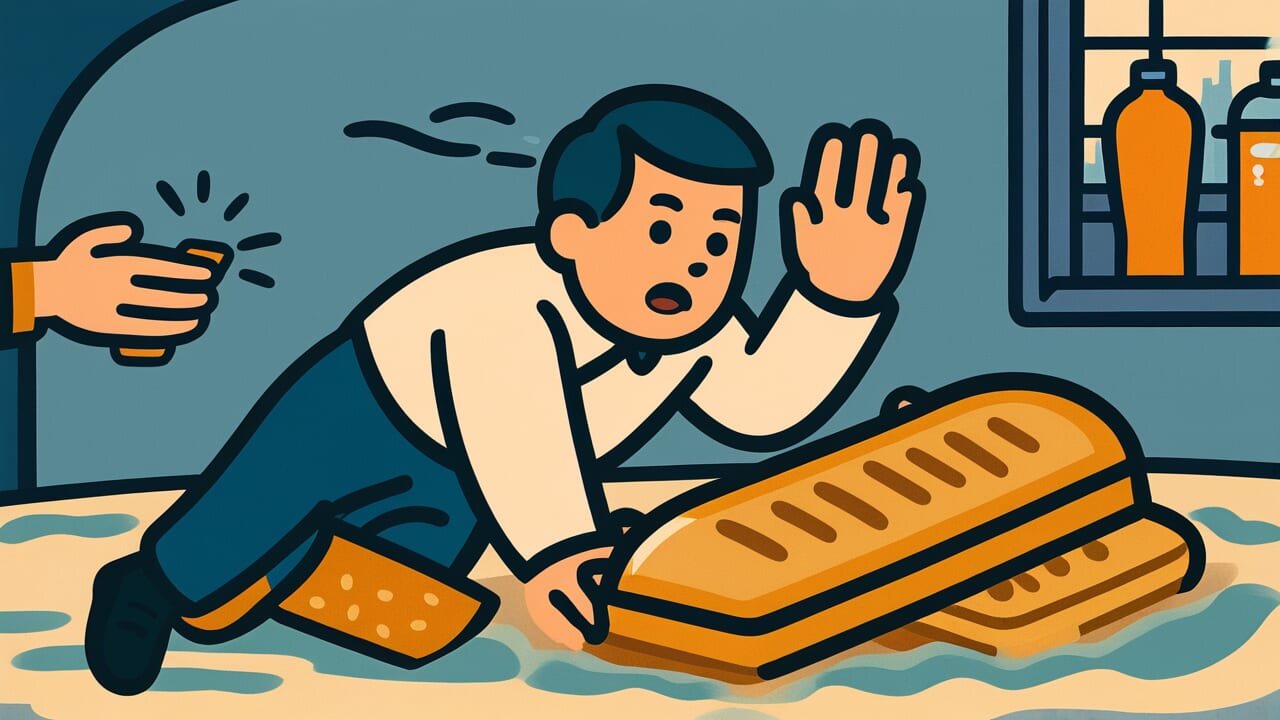How to Read “Not falling to hunger but falling to illness”
Kū ni taoреzu yamu ni taoreru
Meaning of “Not falling to hunger but falling to illness”
This proverb means that people can somehow endure and survive even when life is hard and they struggle to find food. But when they get sick, they inevitably fall.
People have the power to devise solutions and the mental strength to endure external hardships like poverty and hunger. They don’t give in easily to these challenges.
However, illness attacks the body from within. No matter how strong someone’s willpower is, they cannot resist this internal collapse.
This proverb expresses both the strength and weakness of human beings. People use it when teaching about the importance of health. It also applies when explaining that even the hardest workers cannot win against illness.
Even today, we feel the truth of these words when talking about people who ruined their health from overwork. The same applies to those who got sick from pushing themselves too hard.
Origin and Etymology
The exact first appearance of this proverb in literature is unclear. However, based on its structure, scholars believe it emerged from the lived experiences of common people during the Edo period.
“Not falling to hunger” refers to poverty and starvation. People in the Edo period faced life’s hardships many times through famine, crop failure, and unemployment.
Yet humans have remarkable adaptability. They possessed the power to survive even with little food. They made rice porridge to increase the volume, ate wild plants, and endured on one meal a day. People could somehow bear poverty through such ingenuity.
On the other hand, “falling to illness” literally means getting sick. Back then, there was no modern medical system or medicine. Even a minor illness could be fatal.
No matter how strong someone’s mental fortitude was, once disease invaded their body, they became powerless.
This contrast is fascinating because it expresses both the power of human will and the limits of the body. People can handle external hardships like poverty through ingenuity and patience.
But they cannot resist internal collapse from illness. This proverb contains our ancestors’ harsh recognition of reality.
Usage Examples
- That person endured a life of poverty, but as the saying goes, “Not falling to hunger but falling to illness”—after catching a bad cold, they suddenly became weak
- My grandfather overcame every hardship, but as “Not falling to hunger but falling to illness” shows, he couldn’t win against disease
Universal Wisdom
This proverb has been passed down through generations because it brilliantly captures a fundamental contradiction in human existence. We are spiritual beings, but we also dwell in physical vessels called bodies.
What’s fascinating is how powerful human willpower can be. People display remarkable adaptability against external hardships like poverty, hunger, and cold.
They can keep hope alive, devise creative solutions, and endure by believing in tomorrow. Looking back at history, countless stories tell of people who survived extreme conditions. The power of the spirit sometimes seems to transcend even physical limitations.
Yet this proverb also teaches us about fundamental human fragility. No matter how strong someone’s will is, everything collapses when the body fails.
Illness has the terrifying power to render human dignity, pride, and willpower completely helpless.
This duality is the truth of human existence. We are both strong and weak. Our spirit holds infinite possibilities, yet we are bound by the limitations of our finite bodies.
Our ancestors faced this unavoidable truth. That’s why they taught the preciousness of health and tried to pass down to future generations the importance of taking care of one’s body.
When AI Hears This
The human body has a surprisingly efficient response system for acute stress like starvation. When blood sugar drops, adrenaline releases within seconds. The liver breaks down stored glycogen to produce sugar.
This reaction completes within hours to days. Once the crisis passes, the body returns to its normal state. In other words, not being able to eat is biologically designed as a “solvable temporary problem.”
However, chronic stress from illness attacks the body through a completely different mechanism. According to allostatic load theory, when the stress hormone cortisol remains high for extended periods, systems meant to protect the body begin to malfunction.
For example, immune cells become overactive and attack even normal tissues. Mechanisms that raise blood pressure damage blood vessels. Reactions that increase blood sugar heighten diabetes risk.
Research shows that people who experience chronic stress for over six months have a 40 percent increased risk of cardiovascular disease.
What’s interesting is that acute stress response is an “on-off switch,” but chronic stress response is “debt that gradually accumulates.” The body continues paying small adaptation costs every day.
Then one day, that debt suddenly exceeds its limit. We don’t fall to hunger but fall to illness because evolution created bodies strong in short battles but vulnerable in long wars.
Lessons for Today
What this proverb teaches us today is the importance of health as our foundation. In modern society, pushing ourselves too hard for work or goals is sometimes treated as a virtue.
People cut sleep, neglect meals, and accumulate stress while continuing to work hard. Human mental strength is indeed wonderful and has the power to overcome many difficulties.
However, this proverb warns us gently yet sternly. If you break your body, everything becomes meaningless. No matter how big your dreams or how important your work, you can only achieve them with a healthy body.
That’s why you shouldn’t put off daily health management. Sufficient sleep, balanced meals, moderate exercise, and mental rest—these aren’t luxuries. They are necessities that support your life.
Working hard is important, but resting is equally important. Your body is an irreplaceable partner for realizing your dreams.



Comments